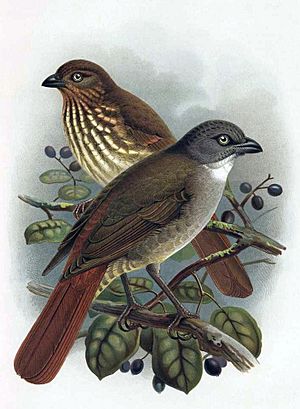Piopio (bird) facts for kids
Quick facts for kids PiopioTemporal range: Recent
|
|
|---|---|
 |
|
| North Island piopio in front, South Island piopio at rear | |
| Scientific classification |
|
| Kingdom: | Animalia |
| Phylum: | Chordata |
| Class: | Aves |
| Order: | Passeriformes |
| Family: | Oriolidae |
| Genus: | †Turnagra Lesson, 1837 |
| Species | |
|
See text |
|
| Synonyms | |
|
|
The piopios or turnagras were a type of bird that used to live only in New Zealand. Sadly, these birds are now extinct, meaning there are none left alive. Sometimes people called them New Zealand thrushes. But they only looked a bit like the thrush family. They were actually part of a different bird group called Oriolidae.
Contents
About the Piopio Family
For a long time, scientists weren't sure where piopios fit in the bird family tree. In 2011, they finally figured out that piopios were related to figbirds. This meant they belonged to the Oriolidae family.
Some people thought piopios might be related to the bowerbird family from Australia. But piopios built different kinds of nests. Their eggs looked different, and their calls sounded different too. Scientists also thought they might be related to birds called whistlers.
Two Types of Piopio
At first, scientists thought there was only one type of piopio. But in 2012, they realized there were actually two different species:
- The North Island piopio (Turnagra tanagra)
- The South Island piopio (Turnagra capensis)
The names given to these birds were a bit funny. The South Island piopio was called Turnagra capensis because a scientist named Anders Sparrman got his bird samples mixed up. He thought it came from South Africa, near the Cape of Good Hope. The North Island piopio was named Turnagra tanagra because people thought it was related to the tanager birds from America. The name piopio comes from the Māori name, piopio-kata.
What Piopios Were Like
We don't know a lot about how piopios lived. They liked to stay in the thick bushes and on the forest floor. They built strong, cup-shaped nests in trees, usually a few meters off the ground. In these nests, they would lay two to four eggs.
A famous bird expert, Walter Buller, said their calls were some of the most beautiful sounds in New Zealand. Piopios could also copy the calls of other birds! They ate many different things, like insects, spiders, fruit, and even oats. They were known to catch insects while flying over rivers.
Why Piopios Disappeared
Both types of piopios are now extinct. This happened because of two main reasons:
- Forests were cut down: A lot of the forests where piopios lived were destroyed. This was especially true in the lowlands.
- New animals arrived: When Europeans settled in New Zealand in the 1800s, they brought new animals with them. These included predators like rats. These animals hunted the piopios and their eggs.
The last confirmed North Island piopio was seen in 1902. Some people reported seeing them as late as the 1970s, but these sightings were not officially confirmed. The last South Island piopio was recorded in 1905. There were ideas to move some piopios to islands where there were no predators. But these plans either didn't happen or couldn't be carried out because there weren't enough safe places.
See also
 In Spanish: Piopio para niños
In Spanish: Piopio para niños
 | Madam C. J. Walker |
 | Janet Emerson Bashen |
 | Annie Turnbo Malone |
 | Maggie L. Walker |

